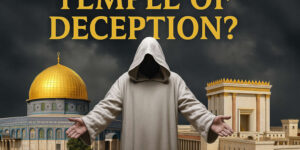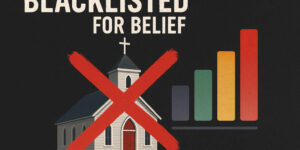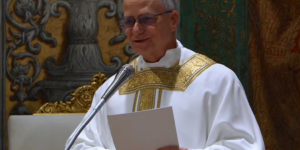The Question No One Is Asking About the Coronavirus
The coronavirus is dominating conversation across America and the globe. Many are getting tired of the constant squabbling and contention it seems to be producing among believers. Personally, although it is a serious crisis, the varying opinions of both preachers and many saints is providing some entertainment and even humor for me. It’s sort of like the story of the blind man in John 9.
First, the question was asked by Jesus’ disciples why a certain man was born blind. Did his sin or the sin of his parents cause him to be born blind? The question was completely off center. It was not the right perspective. They were seeing things through the lens of the law. Jesus offered them God’s perspective.
“Neither this man nor his parents sinned. But it happened so that the works of God might be displayed in him” (John 9:3).
Then after Jesus healed the blind man the haggling began among the townsfolk and religious leaders of the identity of both the blind man and Jesus. It’s quite humorous. You should read it. It reminds me of the constant wrangling and disputing over the coronavirus.
“Is it some kind of conspiracy?”
“Should the church close its doors to services?”
“Why are we fearful and hiding?”
“Should we obey the laws of the land to not meet?”
“Shouldn’t the church be holding prayer meetings, evangelizing and healing the sick?”
My question is: “Is this a litmus test on the pulse of the American church?”
Questions We Actually Should Be Asking
In light of the increasingly gross darkness and antichrist spirit that is in the world, here are the questions more Christians should be asking, especially our church and ministry leaders:
If churches today lost their buildings, could they still function as churches? If there was war, a great crisis (this coronavirus is a small test and a light affliction in comparison to what is coming) or severe persecution against the church, as there could very well be in the very near future of America, could they still function as a church? Would churches be able to continue meeting as a spiritual family and a body in fellowship, teaching, worship, prayer and taking care of one another without a large facility? Would the believers throughout a city or region stay connected? Are our connections based solely on a physical facility or really on relationship with the Lord and with each other? Or would the loss of a building mean the essential loss of the church?
What if a large church today lost its budget, paid staff or senior pastor? Would there still be shepherds to care for the sheep? Or would there be hirelings looking for professional “ministry” elsewhere? I just watched Sheep Among Wolves Vol. 2 for the second time, a gripping documentary and feature film on the underground church in Iran, who are providing the model for discipling the nations without any of the aforementioned amenities.
What if a church lost its denominational affiliation—would it cease to exist? Or if a non-denominational church dropped their seeker-friendly philosophy or in-vogue style of doing church, or their various programs that attract people, would they still exist as a church? How much of our dependence have we placed on these things? And perhaps the biggest question upon which hangs all other questions is this: Without any of these things, could the church still have its identity in Jesus alone?
These are not easy questions, but here is the bottom line: How much of Christ do we have in our lives, our relationships, our churches and our ministries? After all has been said and done, after we strip away all the props that are holding up these modern churches, how much of the church’s identity and character is found in Jesus alone?
Unless We Lose Our Lives We Have Little Identity With Jesus
The apostle Paul made this statement: “or to me, to continue living is Christ, and to die is gain” (Phil. 1:21). As with our true brothers and sisters in Iran, until death becomes a viable option as a believer, many will continue to cower to fear. We are living in the day where we must look at death as a true option in serving Jesus. No one wants to die, as death is an enemy, but we need to also understand that the true believer has been delivered from the fear of death that subjects us to bondage (Heb. 2:15). All of us may not be called upon to die physically as a martyr, but as followers of Jesus we are certainly called to die to ourselves, to deny ourselves, and to take up our cross and follow Jesus. In this way, we can overcome all fears.
All fears are connected to the biggest fear: the fear of death. No fear of death means no fear of man, no fear of disease, no fear of rejection, no fear of persecution and no fear of arrest. We love and serve people with the purest motives while preaching an uncompromised gospel with a demonstration of power derived from a committed life of prayer, fasting and the giving of our lives.
To me, this is, at least in part, what the coronavirus is all about. It’s a litmus test that is exposing our hearts, and so far, much of the Western church is flatlining.






































